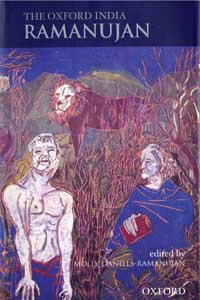Doniger shares insights on Ramanujan’s poetry, teachings
By Seth SandersNews Office
 | |
If Wendy Doniger has made a career of creatively juxtaposing cultural worlds to advance the study of religion—specifically those of India and America—readers have a new chance to meet one of her chief models and one of Chicago’s most distinctive and influential figures.
The works of A.K. Ramanujan, a legendary translator, poet and former professor in the Committee on Social Thought, who also won a MacArthur fellowship, have recently become available in The Oxford India Ramanujan.
Ramanujan’s chief academic impact was in revealing that in addition to the great high-cultural tradition of Sanskrit, India had thousands of years of rich and sophisticated folk culture in such languages as Tamil.
In this area, he raised up a whole generation of scholars like Chicago’s Norman Cutler. In addition to studying oral tradition, Ramanujan, said Doniger, was a great transmitter of sayings, “a kind of folklore that had to be recorded quickly because they didn’t write.
“The paradox of him,” Doniger said, “was that he lived in Chicago by choice and taught Shakespeare, but he felt the best part of him was Indian. He once said he was the hyphen in Indo-American. His sadness was that while he was in India, he missed America, and in America, he missed India. He was never really complete in any one place, but that also is why he was so wonderful.
“He always was on the side of the angels in regard to the human values involved in a project, never ‘politically correct’ but he had a feeling for the underdog, for people of color, for women, for the poor, and he didn’t have to work at it. There was always a lot of heart in it—he was sharp as a tack and very critical, an interesting combination—he didn’t just love everything but he loved the right things.”
Indeed, Ramanujan’s presence at the University may well have set a precedent for Doniger’s project. As the Indian scholar U.R. Ananthamurthy remarked, “What was patronizingly and dryly taught as oriental studies changed with Ramanujan. The discipline became alive and creative, and that part of Chicago where he taught and lived became virtually a part of South India.”
Ramanujan won a following here teaching Yeats, Pound, Joyce, Shakespeare, Whitman, Melville and Eliot. Saul Bellow said he was “astonished that Ramanujan” had “such a grasp of British and American poetry. He really gets inside those poets.” Yet he also earned the Padma Sri from the Indian Government, one of their highest honors, for contributions to Indian literature and linguistics.
After serving as a Visiting Professor at Chicago, the distinguished Indian playwright Girish Karnad wrote Play with a Cobra. The source of his script was a Kannada myth, but Karnad did not read the myth in an ancient text—he learned it as “it was told to me by A.K. Ramanujan.”
![[Chronicle]](/images/sidebar_header_oct06.gif)